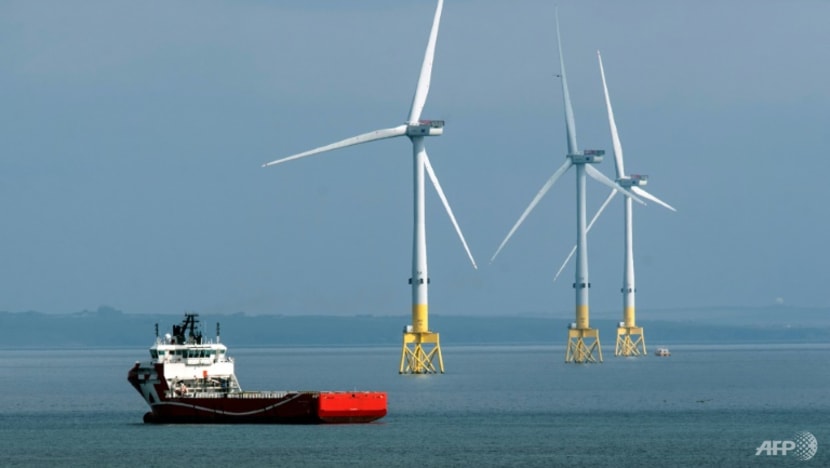Energy crisis spurs green momentum, but countries need to ‘accelerate transition’: Experts
Many countries lack the ability to transition far or fast enough as they do not have natural renewable resources or the financial capability to do so, says an expert.

Offshore wind turbines are a clear sign of a move towards green energy off the coast of Aberdeen in northeast Scotland (File photo: Digital/AFP/Andy Buchanan)
The energy crisis fuelled by Russia’s invasion of Ukraine this year has powered an unprecedented acceleration of renewables, according to the International Energy Agency (IEA).
Total capacity growth for clean energy worldwide is expected to almost double in the next five years, overtaking coal as the largest source of electricity generation, said an IEA report released in early December.
However, countries need to "accelerate their transition" in order to meet the global push to reach net-zero emissions by 2050, experts said.
Sanctions on Russia’s energy and commodities, along with supply chain disruptions, pushed global energy prices sky high this year and forced nations to turn to other sources to power households and businesses.
While this has spurred the transition to green energy, a good proportion of power generation is still heavily dependent on oil, coal and gas, observers said.
Many countries merely shifted their reliance on Russian gas to other fossil sources, instead of making a more committed switch to green energy, said Professor of Energy Daniel Kammen from the University of California, Berkeley.
Looking at how the war in Ukraine plays out to determine the future of energy prices is a short-term outlook that still places much dependence on fossil gas and is not sustainable in the long term, he added.
“Countries need to significantly accelerate their transition off of not only Russian gas, but all gas because ultimately for the climate equation, it doesn't matter where that fossil gas comes from,” Prof Kammen told CNA’s Asia First on Tuesday (Dec 20).
“The longer term equation is: Not only coal has to go away, but fossil gas has to go away as well. And (the latter is) more controversial because many countries are still exploring and finding new sources of fossil gas, and not using this moment to transition to renewables,” he added.
For countries to stop being reliant on fossils, and to stop being vulnerable to fluctuating energy prices controlled by oil-producing nations, renewable energy needs to be more widely used.
“But unfortunately, we've been moving fairly slowly,” said Prof Kammen.
WHY IS THE TRANSITION SO SLOW?
Mr Brian Murphy, head of Bain & Company’s Asia-Pacific energy and natural resources practice, told CNA that the current challenge many countries are facing in energy transition is the move from a commitment phase into a delivery phase.
This requires high degrees of alignment across companies, industries and countries, he said.
However, this is happening at a time when geopolitical issues have created a more volatile environment, which will cause the transition to happen in a more fragmented and disorderly manner across the world, Mr Murphy explained.
Other challenges around scaling up new energy solutions include the availability of talent and the building of new supply chains.
Current subsidies for fossil fuels are also quite extreme, said Prof Kammen, which may explain why many countries or organisations are slow or reluctant to make the switch.
TOUGHER TRANSITION FOR SOME COUNTRIES
“It's helpful to think about the separation between the ability to transition and the willingness to transition,” Mr Murphy said.
Most countries are willing to switch to greener energy and have made great efforts to do so. However, many nations lack the ability to transition far or fast enough as they do not have natural renewable resources or the financial capability to do so, he said.
He noted that Asia Pacific, in particular, sees a wide range of progress in transitioning into renewables, as countries in the region have vast differences in development, natural resources, and wealth.
Nations could take on different roles in the trade mix and aid each other in the production of green technology, Mr Murphy said. For instance, a country that is rich in natural resources could supply raw materials to a country strong in manufacturing, which could then become an exporter of green technology.
Despite the different progress in their green transition, Mr Murphy said that observers are confident that the medium- to long-term trajectory towards clean energy is clear.
The new energy economy also presents huge opportunities, said Prof Kammen.
Renewables are expected to account for more than 90 per cent of global electricity expansion in the next five years, according to the IEA.
“So we have added challenges but the greater job capacity in the clean energy economy, the need to move from a hydrocarbon-based system to really a smart material system – those are actually more opportunities than challenges,” said Prof Kammen.
















